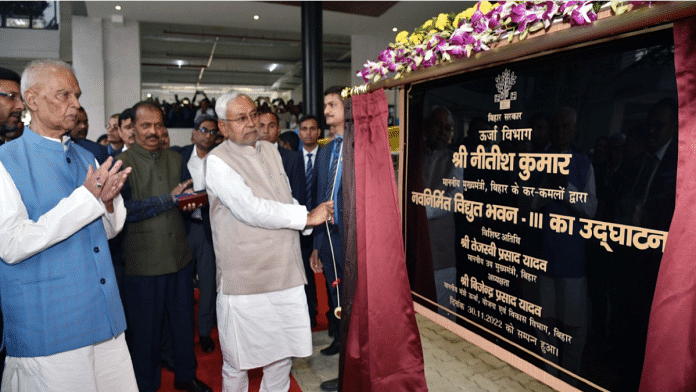Patna: Unlike other politicians who promise free electricity to the masses, Bihar Chief Minister Nitish Kumar has disapproved the populist measure, saying he stayed away from it even during the time of elections.
Nitish instead called for uniform tariff rates — ‘one nation, one power tariff’ policy — for states to purchase electricity from the central government.
“Some states are giving electricity for free. Some people speak about giving electricity for free. Some are making announcements. Many talk about buying power at higher prices and supplying the consumers without charging them anything,” the Bihar chief minister said Wednesday at the launch of power projects worth over Rs 15,000 crore.
He went on to criticise the trend of announcing and providing electric subsidies as “inappropriate”.
“I have taken a stand against providing free power even in my election rallies,” Nitish said, without taking the names of states like Punjab, Delhi, Madhya Pradesh, and Rajasthan. “We give subsidies to our power consumers. We purchase electricity at a much higher rate and provide our consumers at a much lower rate.”
From 700 MW in 2005, he said, the electricity consumption has gone up to 6,738 MW in Bihar.
In making his dislike known against the competitive populism that prompts such freebies, Nitish seemingly appears to have endorsed PM Narendra Modi’s view against ‘revari’ politics even though the Janata Dal (United) or JD(U) and the Bharatiya Janata Party (BJP) parted ways in August.
The prime minister made the ‘revari culture’ remark in July while cautioning the people of dangers posed by the politics of freebies. The same month he asked states to clear power dues totaling Rs 2.5 lakh crore that they owe to discoms and gencos.
Though Modi did not name anyone in his message, many saw it as a disapproval of Aam Aadmi Party’s (AAP) election announcements of giving free electricity to voters. The AAP has been consistently making this promise during elections in Delhi, Punjab and now Gujarat.
“Nitish Kumar’s views on revari culture appears to match PM Modi’s. In Gujarat, PM Modi has been asking people to reject free power. He asked them to earn money from the power supply,” BJP leader and former deputy chief minister Sushil Kumar Modi said, stressing that free power ruins the economy of a state.
After the PM’s message to the people, the BJP told its state units to refrain from announcing “short-term freebies” in election manifestos, saying that such announcements burden the exchequer and may lead to financial disaster for the states.
Also Read: How AAP govt can rationalise free electricity, reduce subsidy burden, and keep poll promise
Changing face of Bihar’s electricity scenario
Along with Madhya Pradesh, Rajasthan and Uttar Pradesh, Bihar were clubbed in the Bimaru group in the mid-1980s for their poor performance in Human Development Index that evaluates quality of life.
Before Nitish took power in 2005, power supply was erratic in Bihar with many villages remaining outside the electricity map. Even places having electricity connections outside Patna used to get power supply for about four-five hours a day.
In the last 22 years in which he took oath as chief minister eight times, Nitish can claim to have ushered in many reforms, including better power connectivity, in the eastern state.
In 2017, Nitish announced that all villages in Bihar have electricity and added that every household would have a free power connection by the end of the next calendar year.
According to power sector officials, Bihar pays Rs 800 crore per month to electricity generation company NTPC for purchase of power. While the state purchases power at Rs 5.80 per unit from NTPC, it gives a subsidy of Rs 1.83 per unit to consumers.
Despite facing demand to give free power to farmers, Nitish has not succumbed to the populist measure and preferred other options like giving subsidy in purchase of diesel to the farming community.
“Bihar cannot afford free power distribution in its current financial condition,” Asian Development Research Institute (ADRI) director P. P. Ghosh remarked. The economist said that at most, the state can give up to 50 units of free power to the poor. “But beyond that it would be the rich gaining benefits.”
Former professor of economics N. K. Choudhary said the message of Nitish sounds more political than one rooted in economics. “Free power all depends if you can afford it and if you are willing to take the state to bankruptcy. Here Nitish appears to be giving a message to the RJD (Rashtriya Janata Dal) that he has options. The RJD has been pressing that Nitish goes to Delhi while Tejashwi becomes the Bihar CM,” he said.
(Edited by Tony Rai)
Also Read: One state’s freebie can be another state’s welfare



